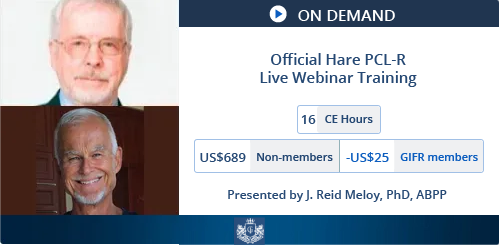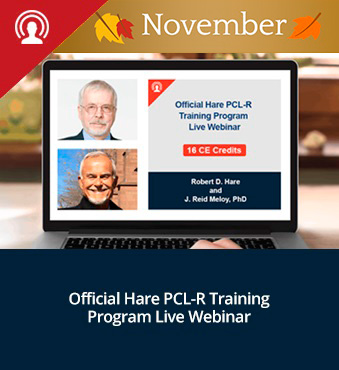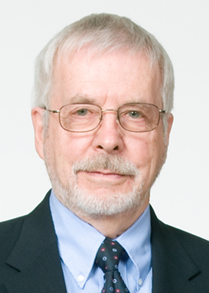Multi-Health Systems, Inc. (MHS, Inc.) is approved by the American Psychological Association to sponsor continuing education for psychologists. MHS maintains responsibility for this program and its content.
The American Nurses Credentialing Center accepts Continuing Education Credit sponsored by the American Psychological Association.
Multi-Health Systems, Inc. (MHS, Inc.), provider #1371, formerly Global Institute of Forensic Research, is approved as an ACE provider to offer social work continuing education by the Association of Social Work Boards (ASWB) Approved Continuing Education (ACE) program. Regulatory boards are the final authority on courses accepted for continuing education credit. ACE provider approval period: 6/8/2025-6/8/2028. Social workers completing this course receive 16 continuing education credits.
Multi-Health Systems, Inc. (MHS, Inc.) is approved by the Canadian Psychological Association to sponsor continuing education for psychologists. MHS maintains responsibility for this program and its content.
Multi-Health Systems, Inc. (MHS, Inc.) has been approved by NAADAC as an approved Continuing Education, Provider No. 144308. Programs that do not qualify for NAADAC credit are clearly identified. MHS maintains responsibility for this program and its content.
Multi-Health Systems Inc. has been approved by NBCC as an Approved Continuing Education Provider, ACEP No. 6711. Programs that do not qualify for NBCC credit are clearly identified. Multi-Health Systems Inc. is solely responsible for all aspects of the programing.
NBCC credit is not available for live webinars nor GIFR Member Exclusive Trainings.
Global Institute of Forensic Research (GIFR) is recognized by the New York State Education Department's State Board for Social Work as an approved provider of continuing education for licensed social workers #SW-0337.
Multi-Health Systems, Inc. (MHS, Inc.) is recognized by the New York State Education Department's State Board for Psychology as an approved provider of continuing education for licensed psychologists #PSY-0036.
Note 1: The CPA's approval of an individual, group, or organization as a CE Sponsor or Provider is restricted to the activities described in the approved application or annual report form. The CPA's approval does not extend to any other CE activity the Sponsor or Provider might offer. In granting its approval, the CPA assumes no legal or financial obligations to Sponsors, Providers, or to those individuals who might participate in a Sponsor or Provider's CE activities or programs. Further, responsibility for the content, provision, and delivery of any CE activity approved by the CPA remains that of the CE Sponsor or Provider. The CPA disclaims all legal liability associated with the content, provision, and delivery of the approved CE activity.




 Robert D. Hare is Emeritus Professor of Psychology, University of British Columbia, where he has taught and conducted research for more than 40 years, and President of Darkstone Research Group Ltd. He has devoted most of his academic career to the investigation of psychopathy, its nature, assessment, and implications for mental health and criminal justice. He is the author of several books, including Without Conscience: The Disturbing World of the Psychopaths Among Us, and more than 200 chapters and scientific articles on psychopathy. He is the developer of the Psychopathy Checklist-Revised (PCL-R) editions and a co-author of its derivatives, the Psychopathy Checklist: Screening Version, the Psychopathy Checklist: Youth Version, the Antisocial Process Screening Device, and the Self-Report Psychopathy Scale (SRP- 4).
Robert D. Hare is Emeritus Professor of Psychology, University of British Columbia, where he has taught and conducted research for more than 40 years, and President of Darkstone Research Group Ltd. He has devoted most of his academic career to the investigation of psychopathy, its nature, assessment, and implications for mental health and criminal justice. He is the author of several books, including Without Conscience: The Disturbing World of the Psychopaths Among Us, and more than 200 chapters and scientific articles on psychopathy. He is the developer of the Psychopathy Checklist-Revised (PCL-R) editions and a co-author of its derivatives, the Psychopathy Checklist: Screening Version, the Psychopathy Checklist: Youth Version, the Antisocial Process Screening Device, and the Self-Report Psychopathy Scale (SRP- 4). J. Reid Meloy, PhD, is a board-certified forensic psychologist (ABPP) and consults on criminal and civil cases throughout the U.S. and Europe. He is a clinical professor of psychiatry at the University of California, San Diego, School of Medicine, and a faculty member of the San Diego Psychoanalytic Center. He is a fellow of the American Academy of Forensic Sciences and is past president of the American Academy of Forensic Psychology. He has received several awards and honors, and was the Yochelson Visiting Scholar at Yale University in March 2015 and Visiting Scholar at University Hospital of Psychiatry Zurich in May 2018. He has authored and co-authored over 240 papers published in peer-reviewed psychiatric and psychological journals, and has authored, co-authored or edited 12 books. His first book, which was published in 1988, was The Psychopathic Mind: Origins, Dynamics, and Treatment. He has been testifying, consulting, researching and writing about personality disorder, psychopathy, stalking, narcissism, criminality, mental disorder, and targeted violence for the past 30 years. Dr. Meloy has been a consultant to the FBI, Quantico, for the past 18 years, and is the originator and developer of the TRAP-18 (Terrorist Radicalization Assessment Protocol, https://gifrinc.com/trap-18-manual/). He is associate editor of the Journal of Threat Assessment and Management.
J. Reid Meloy, PhD, is a board-certified forensic psychologist (ABPP) and consults on criminal and civil cases throughout the U.S. and Europe. He is a clinical professor of psychiatry at the University of California, San Diego, School of Medicine, and a faculty member of the San Diego Psychoanalytic Center. He is a fellow of the American Academy of Forensic Sciences and is past president of the American Academy of Forensic Psychology. He has received several awards and honors, and was the Yochelson Visiting Scholar at Yale University in March 2015 and Visiting Scholar at University Hospital of Psychiatry Zurich in May 2018. He has authored and co-authored over 240 papers published in peer-reviewed psychiatric and psychological journals, and has authored, co-authored or edited 12 books. His first book, which was published in 1988, was The Psychopathic Mind: Origins, Dynamics, and Treatment. He has been testifying, consulting, researching and writing about personality disorder, psychopathy, stalking, narcissism, criminality, mental disorder, and targeted violence for the past 30 years. Dr. Meloy has been a consultant to the FBI, Quantico, for the past 18 years, and is the originator and developer of the TRAP-18 (Terrorist Radicalization Assessment Protocol, https://gifrinc.com/trap-18-manual/). He is associate editor of the Journal of Threat Assessment and Management.
